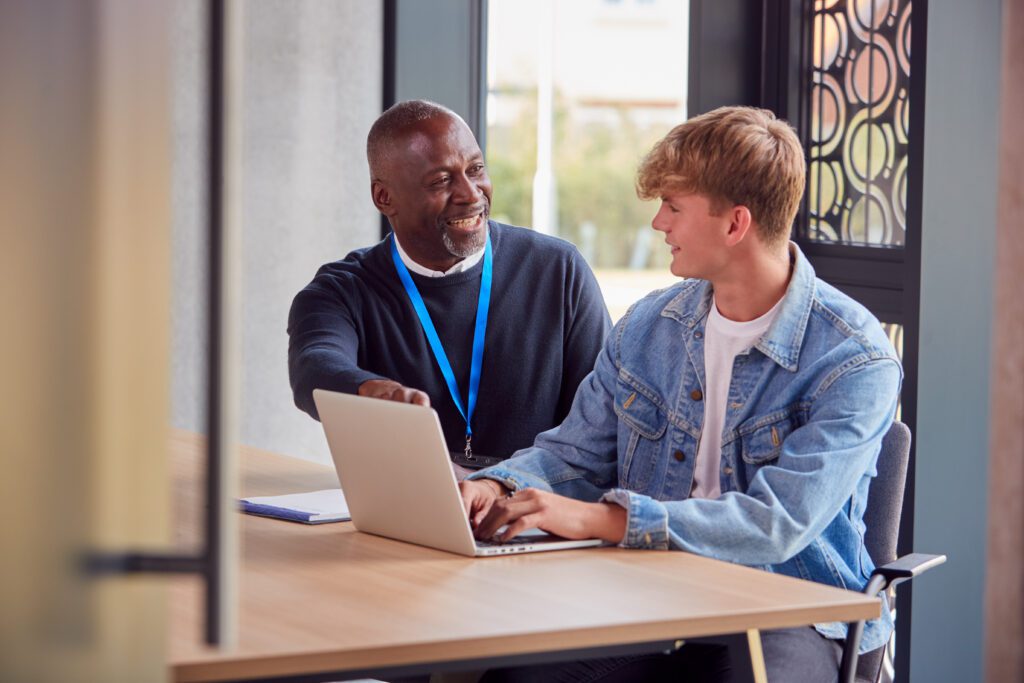Every semester is an opportunity to connect with students. For students who request accommodations, the interactive process is an important dialog. NDC has put together information to help disability service providers maximize these interactions, strengthen accessibility, and implement accommodations for students in their semester ahead.
Let’s break down the key aspects of an individualized, collaborative, and iterative approach to the interactive process.
An Individualized Approach

Central to the interactive process is its individualized nature. Deaf students’ experiences take center stage, shaping the discussion. Tailoring accommodations to each student’s unique experiences, communication mode, academic pursuits, and campus involvement ensures a more inclusive environment.
For deaf students, effective communication is key. Accommodations differ based on the situation and the people involved. Regular conversations about accommodation experiences and upcoming needs can help improve deaf students’ experiences. Remember:
- One-Size Doesn’t Fit All: Every student is unique, so accommodations are personalized.
- Keep Key Considerations in Mind: Experiences, communication preferences, and the situation influence accommodations.
- Always Defer to the Student: Students are the experts on what they need.
Collaborative Decision Making
By embracing a collaborative mindset, the interactive process involves shared decision-making. Transparent communication, active listening, and creating a welcoming space for questions promote positive relationships. Developing connections with members of the college community fosters a sense of belonging and has a positive impact on their overall experience.
Accommodation conversations are important, and are also an opportunity to connect with deaf students and build rapport. When students feel connected and supported, they are more likely to succeed. To build positive relationships:
- Communicate Clearly: Keep the conversation transparent and straightforward.
- Engage in Active Listening: Pay attention to students’ experiences and learn from them.
- Have Honest Conversations: Create a safe space for questions and discussions.
- Acknowledge Power Dynamics: Be aware of power imbalances and take ownership of impact.

Ongoing Accommodations Conversations
The interactive process is not confined to initial interactions—it’s an ongoing journey. As students’ needs evolve throughout their enrollment, the process adapts accordingly. Accommodations and access considerations should be revisited to align with changing circumstances, courses, and experiences. An iterative process enhances access and experiences. Regular check-ins, data collection, and adjustments based on evidence ensure that accommodations remain aligned with each student’s evolving needs. This approach also guards against assumptions and fosters more informed decisions.
Initiating conversations about accommodations involves reviewing past experiences and anticipated needs. Flexibility is essential, as what worked previously might need adjustment in different settings. A fluid approach accommodates varying familiarity levels and encourages trial and error to find optimal solutions.
- Being Flexible: Different students have different experiences and knowledge about accommodations.
- Exploring Options: Some students are familiar with accommodations, while others might need guidance.
- Trial and Error: It’s okay to try different things to find the best solution.
Topics to Cover in Initial Conversations:
Explaining The Purpose and Structure of the Conversation
Valuing The Student's Subjective Experience
Discussing a Range of Accommodation Options
Addressing Barriers and Strategies to Navigate Them
Identifying Supportive Contacts on Campus
Planning for Situations When Services are Unavailable
Explaining The Grievance Process and Available Resources
Clarifying Roles, Responsibilities, and Expectations

To plan for the best experience possible for deaf students, consider these student-focused practices:
- Listen and Learn from Students: Pay attention to student experiences and value their insights.
- Create Space for Dialogue: Encourage questions and include students in the decision-making process.
- Transparency has Value: Be clear in communication and explain when needed.
- Feedback Matters: Consistently collect student feedback.
- Building Rapport: Create authentic relationships with students.
- Be Aware of the Impact of Your Own Lens: Recognize the impact of unconscious and unintentional assumptions and how it shapes experiences of others. Consider how you can contribute to a more inclusive environment, bolstering students’ sense of belonging and success.
Remember, every interaction matters, and by working together, we can create an inclusive and supportive environment for deaf students. If you need more information, refer to the resources section.









